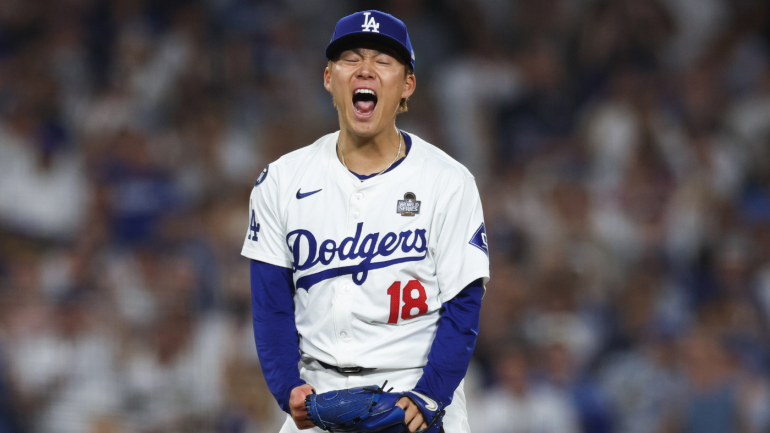
LOS ANGELES -- One night after one of the most amazing and dramatic World Series games in history, the Dodgers cruised to a 4-2 victory to take a 2-0 lead in the best-of-seven Fall Classic. There were no late-inning fireworks, nor did the Dodgers require any. That's because Yoshinobu Yamamoto was in total control for much of the night.
He also really helped them set up for the rest of the series. We'll get to that.
First, though, remember when Yamamoto was posted from Nippon Professional Baseball last offseason? The consensus was that he'd clear $250 million pretty easily and that means there was a limited pool of teams involved in serious bidding. As the time ticked down, two clear favorites among his suitors emerged: The Yankees and the Dodgers.
Through that lens, Yamamoto here in Game 2 of the World Series was showing the Yankees what they missed out on. Yamamoto inked a 12-year, $325 million deal with the Dodgers and looked worth every penny in this one.
Really, other than his first start, he's been brilliant. Yamamoto was 7-2 with a 3.00 ERA and 1.11 WHIP with 105 strikeouts in 90 innings. This includes his catastrophic debut, when he gave up five runs in one inning in Seoul. He missed a big chunk of the season due to a shoulder injury, but he's been progressively getting better since his return.
"Every time I pitched, the last three games, I became more comfortable and I'm feeling better," Yamamoto said through an interpreter before Game 1. "Of course it's a World Series, so I might face a challenge, but I think I'm -- because that benefits me, those previous three outings during the postseason."
Yes, he was good in his previous two playoff starts after a bad one to start, but he was full-on dominant in Game 2, his first World Series start. In 6 ⅓ innings of work, he only allowed one hit. It was a solo home run off the bat of Juan Soto, but that can be forgiven because it's Juan Freaking Soto in the World Series. The only other blemishes on Yamamoto's ledger Saturday were two walks, but he pitched around those with relative ease. He struck out four. He induced lots of weak contact. He was masterful.
Now, it wasn't just Yamamoto's outing that was impressive. It was the pressure he was able to take off the bullpen. Sure, there's a day off before Game 3, but the Dodgers might have to play three games in three days in New York -- unless they sweep and end this thing in four. This was the first time in 21 games that a starting pitcher against the Yankees went at least six innings.
With Walker Buehler and a bullpen game looming, Yamamoto's brilliance and workload in Game 2 allowed the Dodgers to save a lot of those bullpen bullets. They only needed eight outs and got them from Anthony Banda, Michael Kopech, Blake Treinen and Alex Vesia.
This is what an October ace looks like. The Dodgers have now won seven straight Yamamoto starts, with the latter four being playoff games, and, obviously, this one, his first World Series start.
The best baseball players in the world are excellent at curbing any nerves or emotions for the biggest games. They might feel nervous internally, but you can never tell from the outside. Yamamoto exemplified this in Game 2, looking calm and stoic throughout the outing. His manager was confident that's exactly what we'd see.
"The thing that excites me is his temperament, poise, the ability to control his emotions and still make pitches," Dave Roberts said before Game 2.
On the biggest stage, Yamamoto delivered the goods and perfectly illustrated why he got the most lucrative pitcher contract in MLB history. Twisting the knife a bit into the Yankees, who missed out on signing him, was just an added bonus. And now the Dodgers need just two wins to earn the trophy.


















